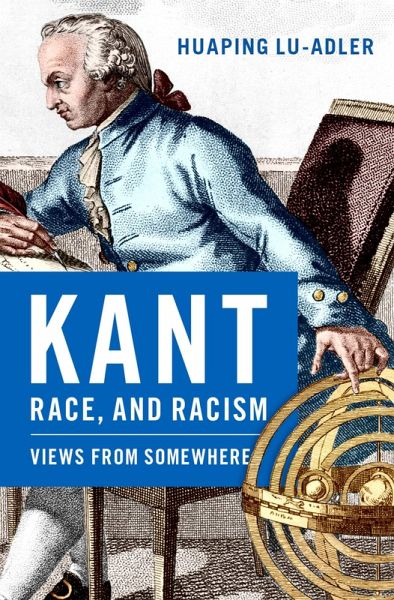
Kant, Race, and Racism (eBook, PDF)
Views from Somewhere
Versandkostenfrei!
Sofort per Download lieferbar
48,95 €
inkl. MwSt.
Weitere Ausgaben:

PAYBACK Punkte
24 °P sammeln!
Kant scholars have paid relatively little attention to his raciology. They assume that his racism, as personal prejudice, can be disentangled from his core philosophy. They also assume that racism contradicts his moral theory. In this book, philosopher Huaping Lu-Adler challenges both assumptions. She shows how Kant's raciology--divided into racialism and racism--is integral to his philosophical system. She also rejects the individualistic approach to Kant and racism. Instead, she uses the notion of racism as ideological formation to demonstrate how Kant, from his social location both as a pro...
Kant scholars have paid relatively little attention to his raciology. They assume that his racism, as personal prejudice, can be disentangled from his core philosophy. They also assume that racism contradicts his moral theory. In this book, philosopher Huaping Lu-Adler challenges both assumptions. She shows how Kant's raciology--divided into racialism and racism--is integral to his philosophical system. She also rejects the individualistic approach to Kant and racism. Instead, she uses the notion of racism as ideological formation to demonstrate how Kant, from his social location both as a prominent scholar and as a lifelong educator, participated in the formation of modern racist ideology. As a scholar, Kant developed a ground-breaking scientific theory of race from the standpoint of a philosophical investigator of nature or Naturforscher. As an educator, he transmitted denigrating depictions of the racialized others and imbued those descriptions with normative relevance. In both roles, he left behind, as one of his legacies, a worldview that excluded non-whites from such goods as recognitional respect and candidacy for cultural and moral achievements. Scholars who research and teach Kant's philosophy therefore have an unshakable burden to take part in the ongoing antiracist struggles, through their teaching practices as well as their scholarship. And they must do so with a pragmatic attention to nonideal social realities and a deliberate orientation toward substantial racial justice, equality, and inclusion. Lu-Adler pushes the discourse about Kant and racism well beyond the old debates about whether he was racist or whether his racism contaminates his philosophy. By foregrounding the lasting legacies of Kant's raciology, her work calls for a profound reorientation of Kant scholarship.
Dieser Download kann aus rechtlichen Gründen nur mit Rechnungsadresse in A, B, BG, CY, CZ, D, DK, EW, E, FIN, F, GR, HR, H, IRL, I, LT, L, LR, M, NL, PL, P, R, S, SLO, SK ausgeliefert werden.













